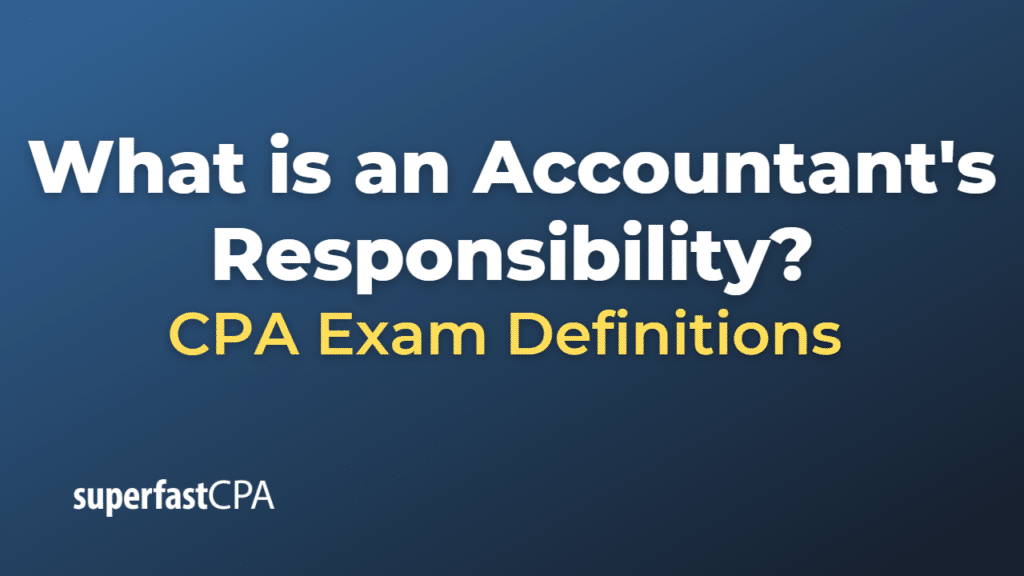Accountant’s Responsibility
An accountant’s responsibility refers to the duties and obligations they have toward their clients, employers, and other stakeholders in the course of their professional work. Accountants play a critical role in ensuring the accuracy, reliability, and transparency of financial information, which is essential for effective decision-making, resource allocation, and performance evaluation. Their responsibilities can vary depending on the specific role they hold and the nature of the services they provide. Some key responsibilities of accountants include:
- Financial record keeping and reporting: Accountants are responsible for maintaining accurate and complete financial records and preparing financial statements that comply with applicable accounting principles, standards, and regulations. This includes ensuring that transactions are recorded correctly, accounts are reconciled, and financial statements are presented fairly and consistently.
- Compliance with laws and regulations: Accountants must ensure that their work complies with relevant laws, regulations, and professional standards, such as tax laws, securities regulations, and ethical codes of conduct. This involves staying up-to-date with changes in the regulatory environment and applying the appropriate rules and guidelines to their work.
- Confidentiality: Accountants have a duty to protect the confidentiality of their clients’ or employers’ financial information and not disclose it to unauthorized parties, unless required by law or with the client’s or employer’s permission. This includes safeguarding sensitive data and using it only for its intended purpose.
- Professional competence: Accountants are expected to maintain their professional competence by staying informed about developments in the field of accounting, including new accounting standards, technologies, and best practices. They should also pursue continuing education and professional development opportunities to enhance their skills and knowledge.
- Objectivity and independence: When providing services such as auditing or financial analysis, accountants must maintain their objectivity and independence to ensure that their work is free from bias and conflicts of interest. This involves being transparent about any potential conflicts and taking appropriate steps to mitigate them.
- Due care and diligence: Accountants have a responsibility to perform their work with due care, diligence, and professional skepticism. This means exercising judgment, critical thinking, and attention to detail in their work, and being thorough and accurate in their analysis and reporting.
- Ethical conduct: Accountants are expected to adhere to the ethical principles and guidelines established by their professional organizations, such as honesty, integrity, and professional behavior. This involves upholding the public trust, acting in the best interests of their clients or employers, and avoiding any actions that could compromise their reputation or the reputation of the accounting profession.
By fulfilling these responsibilities, accountants contribute to the integrity and credibility of financial reporting, promote trust and confidence in the financial markets, and support the effective functioning of the economy.
Example of an Accountant’s Responsibility
Let’s consider a fictional example of an accountant named John who works as a Senior Financial Accountant at a manufacturing company called “BestBikes Inc.
Here’s how John fulfills his responsibilities as an accountant in various aspects of his job:
- Financial record keeping and reporting: John ensures that BestBikes’ financial transactions are recorded accurately and timely in the general ledger. He prepares monthly financial statements, such as the income statement and balance sheet, in accordance with Generally Accepted Accounting Principles (GAAP) and the company’s internal policies.
- Compliance with laws and regulations: John stays informed about changes in tax laws and accounting standards that may affect BestBikes. He ensures that the company’s financial statements and tax filings comply with all applicable regulations.
- Confidentiality: John handles sensitive financial information about BestBikes and its customers. He ensures that this information is securely stored and only shared with authorized personnel or as required by law.
- Professional competence: John regularly attends industry conferences and continuing education courses to stay updated on the latest developments in accounting and finance. He uses this knowledge to improve BestBikes’ financial reporting and internal controls.
- Objectivity and independence: Although John is an employee of BestBikes, he maintains his objectivity when analyzing and reporting the company’s financial performance. He reports any issues or discrepancies that he identifies in the financial statements to senior management and the board of directors.
- Due care and diligence: John exercises due care and diligence in his work by thoroughly reviewing the company’s financial records, ensuring the accuracy of the financial statements, and providing meaningful insights to the management team.
- Ethical conduct: John adheres to the ethical guidelines established by his professional organization, such as honesty, integrity, and professional behavior. He avoids any actions that could compromise his reputation or the reputation of the accounting profession.
In this example, John, as a Senior Financial Accountant, demonstrates his commitment to fulfilling his responsibilities as an accountant. By doing so, he contributes to the accuracy and reliability of BestBikes’ financial reporting, supports the company’s decision-making, and promotes trust and confidence among its stakeholders.













